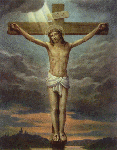
APPLYING OUR FAITH TO OUR FAMILIES
| OVERVIEW |
|---|
CONTENTS
Module VI.
27. Christ and the Church: A Model for Marriage
28. The Holy Family: A Model for the Catholic Home
29. Children: A Model for Family Growth
30. Catechizing the Family
31. Living the Sacramental Life as a Family
32. Catholic Devotions for the Family
33. Catechizing and Evangelizing the Family
34. Why Catholics Don't Evangelize
35. The Catholic Gospel: More Than Saving Sinner
Scott Hahn's Lectures
Groundwork
Salvation History
Four Marks of the Church
Answering Objections
The Sacraments
This final module examines how to apply our Catholic faith to our families. Since it is the family which is the heart of society, a strong family constitutes a strong society, and a society built on the Gospel of Jesus Christ is a house built on a foundation of stone. This final phase concludes with three presentations geared toward responding to our Catholic Christian obligation and to our Holy Father's call to evangelization. At World Youth Day in Denver, Colorado, 1993, the Pope issued one of the sternest warnings ever to Catholics: "“Woe to me if I do not evangelize, Woe to you if you do not succeed in defending life". These last three presentations address the issue of evangelizing the family and then move outward to evangelizing society.
PROGRAM OVERVIEW
In this program Scott shows how the relationship between Christ and His
Church is the perfect model for all marriages and expands upon St. Paul's
teaching on this most Holy Union.
This program deals with just how it is that Joseph, Mary and Jesus are
the perfect model for all Catholic homes. Scott looks at each of their
roles in the family and examines the example each one sets for all of us.
29. Children: A Model for Family Growth
In this program Kimberly takes the class through her own study of
Scripture and the teaching of the Catholic Church about children.
Kimberly explains in detail that, contrary to the view of secular
society, these little children are actually blessings from God. They are
the embodiment of the total self-giving love of husband and wife and, in
a real sense, complete the familial reflection of the Blessed Trinity
that was originally intended by God in the marital covenant. This
familial reflection gives new meaning to God's word in Genesis, "God
created man in His own image and likeness."
30. Catechizing the Family
In this program Kimberly expands upon program 29. She focuses on the
vocation of marriage and the call, not only to procreate children, but to
educate them as well. Kimberly, drawing from her many years of study as a
theologian, and her experience as a mother of four, explains not only the
spiritual dimension of this vocation involving children, but also the
practical applications of educating them as well.
31. Know Your Rites: Living the Sacramental Life as a Family
In this program Kimberly, drawing from Philippians 1:6, shows how God,
through the Sacraments, begins a great work in all who receive them and
that it is God who brings that work to completion in each of us. Kimberly
takes the class through the seven Sacraments and explains how the
Sacraments are God's way of infusing grace, His own divine life, into His
children--His sons and daughters. She goes on to emphasize the need for
all families to apply these Sacraments to their lives and to make them a
part of their everyday experience.
32. Overworked and Underprayed: Catholic Devotions for the Family
This program builds upon program 30. Kimberly begins this presentation
with a close look at the relationship between Mary and Joseph and
emphasizes the need for fatherly spiritual leadership in the family. From
there she continues her discussion of the Sacraments and moves into
developing Catholic spirituality as a family.
33. Catechizing and Evangelizing the Family: A Vision for the 21st Century
In this program Scott takes a look at what it means to catechize and to
evangelize. Because these two words and their meanings are commonly
lumped together without distinction, there is a lack of adequate
catechizing and effective evangelization. Scott not only explains what is
involved in proper catechesis and evangelization, but offers us as well
the techniques to do it. He explains certain methods that work within the
family for catechizing children, methods for evangelizing ourselves and
methods for reaching out to our separated brothers and sisters.
34. The Great Omission: Why Catholics Don't Evangelize
In this program Scott takes a look at what it really means to be a
Catholic--what it means to be in Christ, and how we can impart the
Christian faith, especially to our children.
35. The Catholic Gospel: More Than Saving Sinners
In this program Scott draws from the points he brought out in programs 33
and 34. He explains what the Good News is that we are called to share.
Scott explains that the Catholic gospel is no less than God establishing
sinners as sons and daughters in the Family of God, a truth that has been
taught for almost two thousand years.